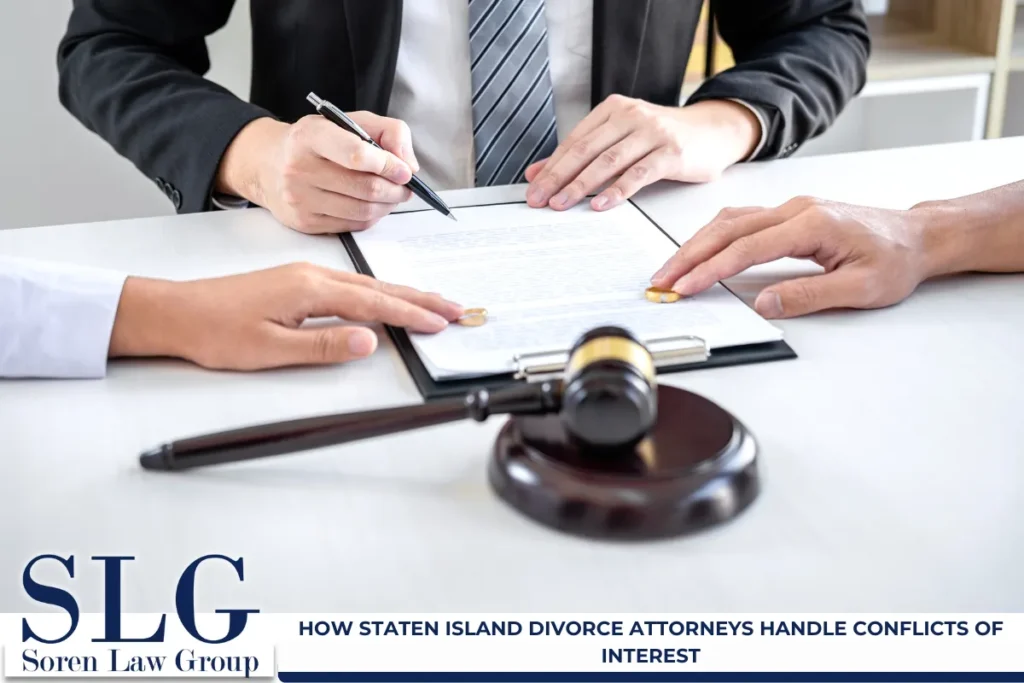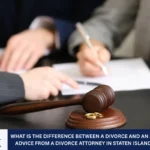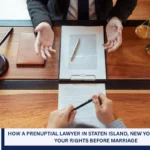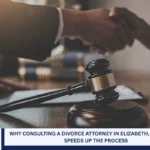If you’re looking for a divorce attorney in Staten Island, you may wonder how they deal with tricky situations like conflicts of interest. These situations come up more often than you might think—especially in divorce cases where emotions run high, relationships overlap, and confidential information needs protection. In this article, we’ll explain exactly how divorce lawyers handle these situations while staying professional and fair. We’ll keep it simple so anyone—yes, even a sixth grader—can understand.
What Is a Conflict of Interest in Divorce Cases?
A conflict of interest happens when a lawyer’s ability to stay fair and loyal to their client is affected by another relationship. For example, if a divorce attorney once gave legal advice to your spouse, they may not be able to represent you now.
In family law, this gets even more complicated because many issues—like child custody, child support, and marital property—involve deep emotions and sensitive data. This is why lawyers must be extra careful. Every Attorney-Client Relationship is built on trust and confidential information, and the attorney must avoid even the appearance of divided loyalty.
Rules Staten Island Divorce Attorneys Follow
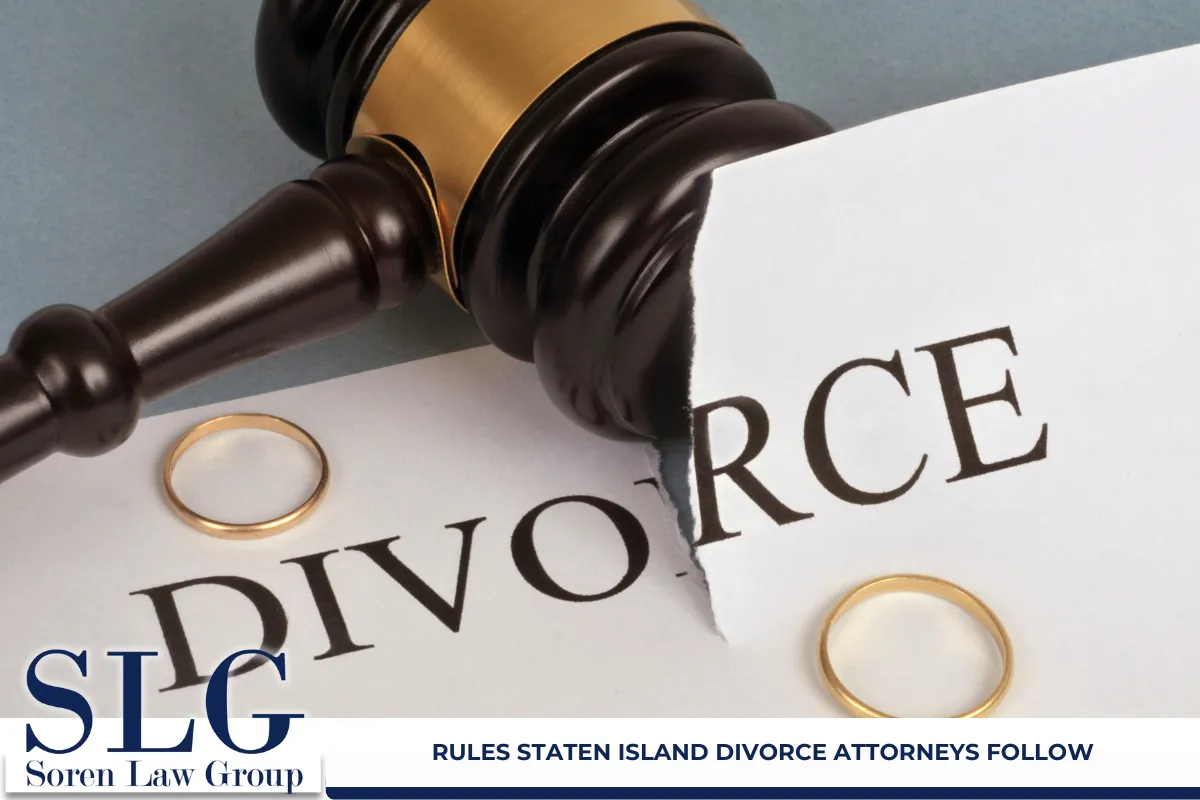
All divorce lawyers in Staten Island follow strict ethical rules. These include the:
- New York Rules of Professional Conduct
- Model Rules of Professional Conduct (used nationwide for guidance)
These professional codes help attorneys protect their clients and make sure no one is being treated unfairly. Specific rules include:
- Rule 1.7: Conflicts with current clients
- Rule 1.9: Conflicts with former clients
- Rule 1.18: Duties to people who talked to the attorney but didn’t hire them
These rules are especially important in Family Court, Matrimonial Court, and even in Supreme Court divorce cases.
How Do Attorneys Prevent Conflicts Before They Start?
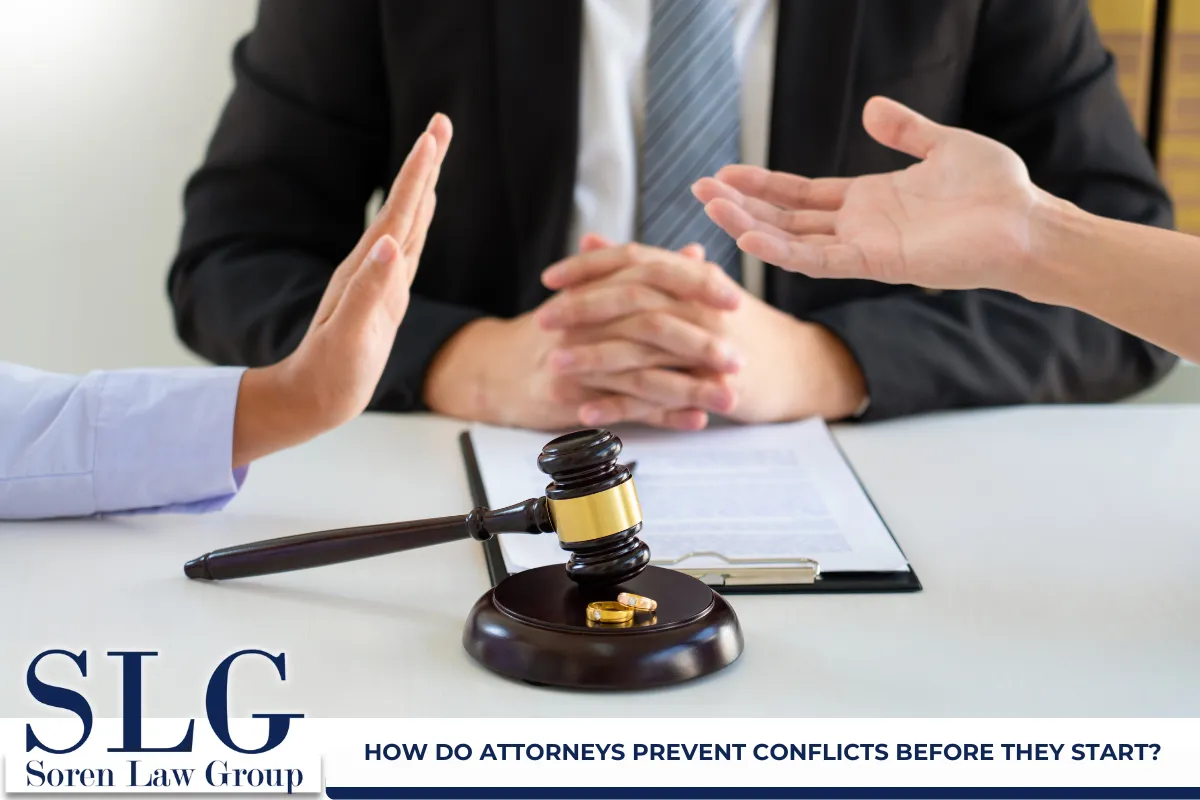
Before taking on a new client, a legal team will perform a conflict check. This is like a background check, but for legal relationships. The attorney will look through their firm’s database to see if anyone at the firm has ever represented your spouse or been involved in a related legal matter.
This helps prevent what’s called “imputation of conflicts.” That means if one lawyer at a firm has a conflict, the whole firm might be blocked from helping you unless they use special screening techniques.
What Happens If a Conflict Is Found?
If a conflict of interest is discovered, the attorney must do one of the following:
- Refuse the case if the conflict cannot be fixed
- Get informed consent from both clients, in writing (if allowed)
- Set up an “ethical wall” to block off the lawyer with the conflict from the case
- Withdraw from the case entirely
This is very common in divorce cases, especially when someone tries to “conflict out” the top attorneys in town by scheduling lots of consultations—just so the other spouse can’t hire them.
How This Affects Child Custody and Support Cases
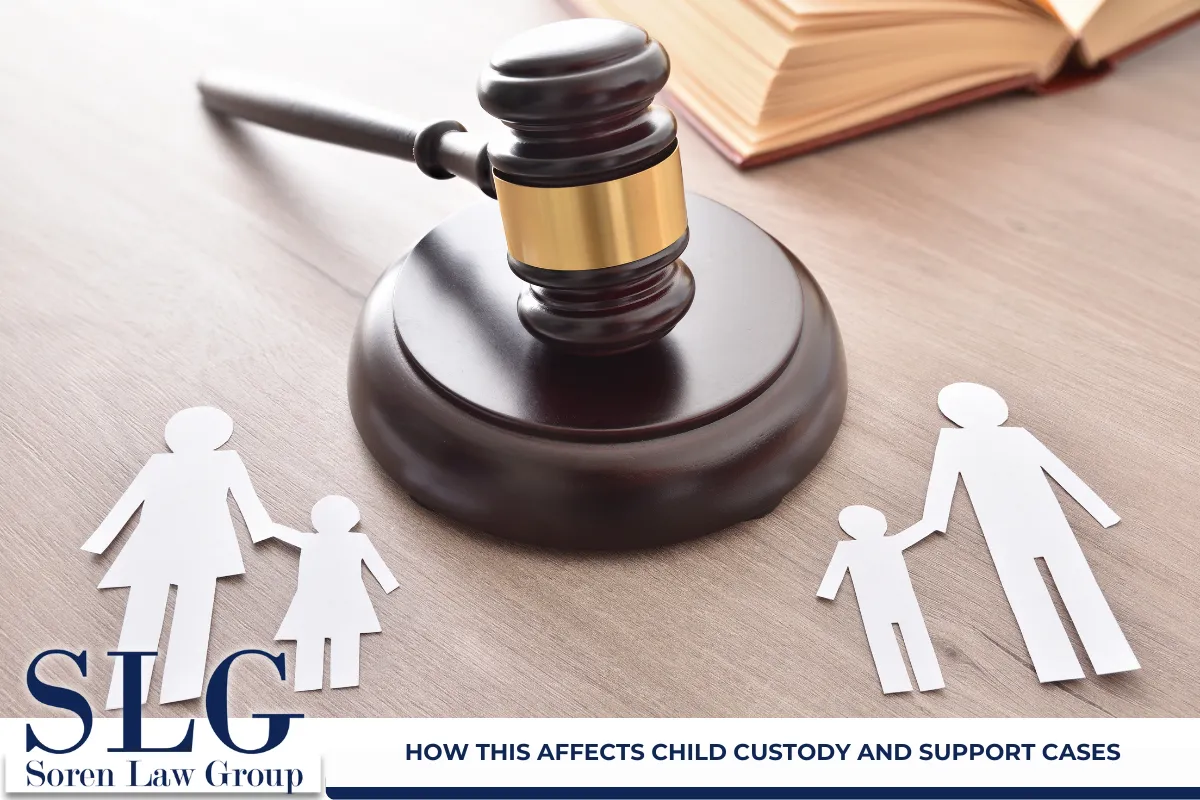
When there are custody disputes or custody arrangements involved, a conflict can create big problems. For example, if a lawyer previously helped the other parent in a child custody matter or child support case, they probably can’t represent you now.
This is also true in Custody stipulation cases or when negotiating court orders in Family Court. Lawyers must remain fully committed to one side—and they can’t switch teams in the middle of the game.
What Courts Do About Conflicts
In court settings like the Matrimonial Court or Family Court, judges take conflicts seriously. If a conflict is reported, the judge might:
- Disqualify the attorney
- Delay court hearings until the issue is resolved
- Dismiss improperly obtained legal documents
- Issue strict court orders to protect confidential information
Sometimes, the divorce process is paused until the legal representation is fully sorted out. This ensures that every client gets fair treatment and that the legal process stays clean and unbiased.
Unique Situations in Staten Island Divorce Cases
Staten Island has its own legal culture, but divorce attorneys here still follow state-wide rules. However, they’re used to seeing unique situations like:
- Business Divorce or splitting up marital assets like retirement accounts
- Handling prenuptial agreements
- Protecting marital funds in contested vs. uncontested divorce situations
- Navigating Legal Separation vs. full Dissolution of Marriage
In all these legal matters, the lawyer must ensure no hidden connections could impact their judgment.
When Conflict Isn’t So Clear: Professional Judgment Matters
Sometimes, the rules don’t give a clear answer. That’s when a divorce lawyer must use their professional judgment. They ask:
- Will this hurt my client’s trust?
- Is there a real risk of leaking confidential information?
- Could this create an unfair advantage?
Attorneys must balance their legal knowledge with their duty to protect you during the divorce process.
How Clients Can Protect Themselves
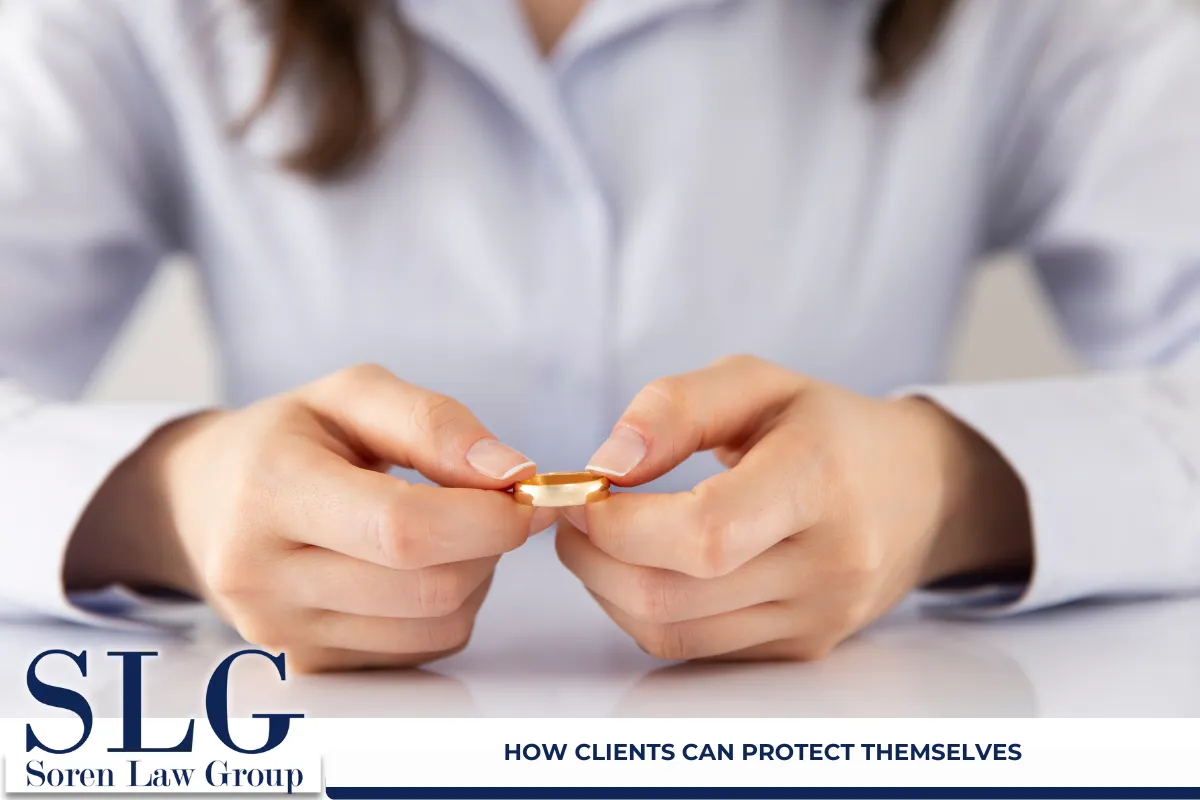
If you’re going through a divorce or Legal Separation, here’s what you can do:
- Ask your divorce attorney if they’ve ever worked with your spouse
- Don’t reveal private info until they confirm they can represent you
- If unsure, request a conflict check
- If a problem arises, report it to the Supreme Court, Family Court, or Criminal Court, depending on where your case is
Always seek legal advice early—before problems start.
Wrapping It Up: Ethics Matter in Every Divorce Case
Every Staten Island divorce attorney is trained to avoid conflicts of interest. They follow the Rules of Professional Conduct, protect your confidential information, and make sure your case is handled with care.
Whether you’re dealing with child custody, marital property, or a no-fault divorce, your lawyer’s job is to stay loyal to you—and only you.
When you choose a lawyer, you’re choosing someone to protect your future. Make sure they’re conflict-free, experienced, and focused entirely on you.
Staten Island Divorce Attorney – Soren Law Group
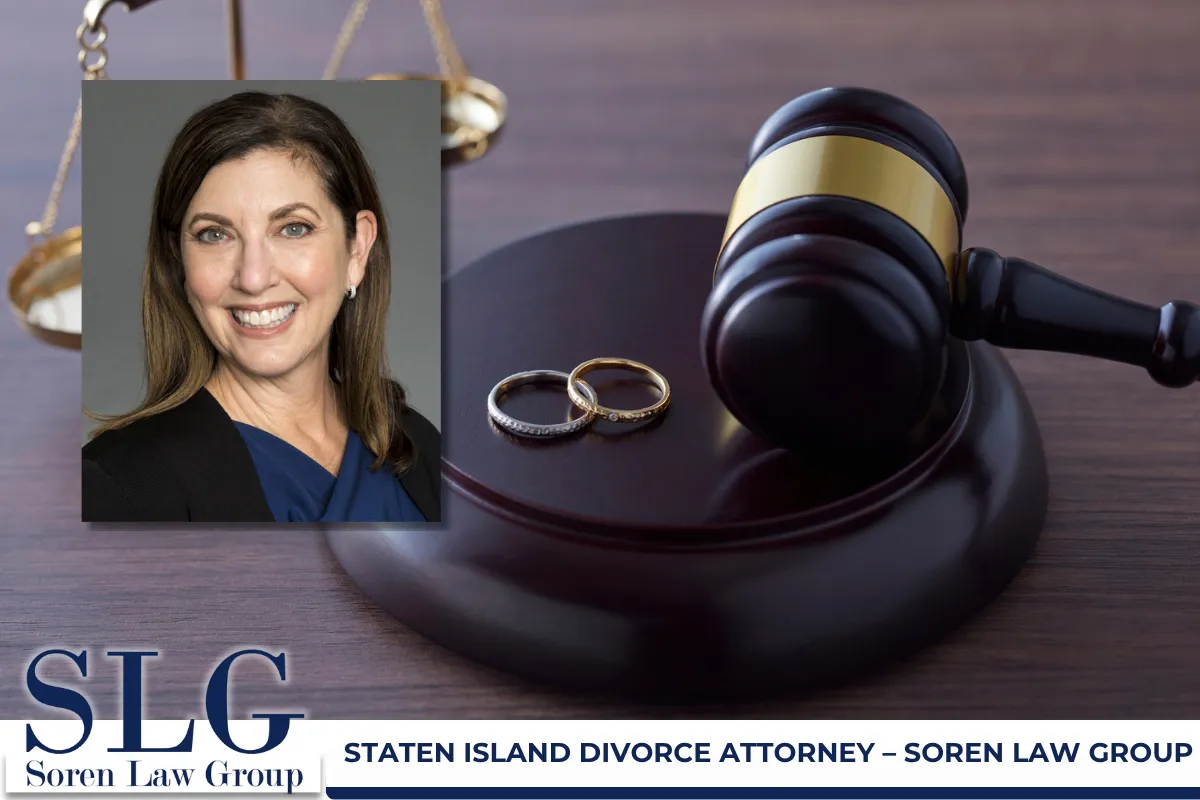
When you’re facing divorce, you need a divorce attorney who understands both the law and the emotional weight of your situation. At Soren Law Group, we provide experienced, ethical, and compassionate representation for clients across Staten Island and nearby areas. Whether you’re dealing with child custody, marital property, or uncontested divorce, our legal team is ready to guide you through every step of the legal process.
We handle even the most sensitive conflicts with professionalism and care. If you’re concerned about a conflict of interest or need trusted legal advice, call us today at (718) 815-4500 or fill out our contact form to schedule a consultation. Let us protect your rights and future.
Frequently Asked Questions: Conflicts of Interest in Divorce Cases
Can I disqualify my spouse’s attorney in Staten Island?
Yes, under certain conditions. If your spouse’s divorce attorney has previously represented you or had access to your confidential information, you may have grounds to ask the court to disqualify them. This is especially important in family law matters, where the integrity of the Attorney-Client Relationship is critical.
To disqualify the attorney, you must show:
- A prior legal services relationship existed.
- The attorney gained information that could be used against you.
- Continuing the legal representation would violate New York divorce law or court rules.
Staten Island judges take these requests seriously. If granted, the attorney will be removed from the case. However, these requests must be supported by real evidence, not strategy. Courts avoid misuse of legal system procedures for personal gain.
Is a prior consultation enough to create a conflict of interest?
Yes, sometimes it is. Even a single meeting with a divorce attorney—if sensitive or strategic topics were discussed—can create a conflict of interest. Under New York divorce law, an attorney owes duties to prospective clients, including confidentiality, even if no formal Attorney-Client Relationship was formed.
The court may consider:
- What was discussed during the consultation
- Whether confidential information was shared
- If that information could now harm you in the divorce process
Attorneys must perform a conflict check to ensure they’re not violating these responsibilities. If a legal team ignores these duties, it can result in court advocacy problems or disqualification. In Staten Island, these situations are more common in complex divorce needs or when clients try to “conflict out” multiple firms.
Can both spouses use the same divorce attorney?
No, not in most contested cases. Under New York divorce law, a single divorce attorney cannot represent both spouses if there’s any disagreement over family law issues like child custody, support, or marital property. Doing so would create a direct conflict of interest.
However, there is one narrow exception:
- In an uncontested divorce, where both parties fully agree
- When both spouses sign a waiver of conflict and give informed consent
- When the attorney helps prepare documents without giving direct legal advice
Still, this method is risky. The court may question the process if it later becomes contested. Many legal professionals recommend each spouse use their own lawyer to protect their rights throughout the divorce process, especially in collaborative law or high-stakes financial matters.
What is a waiver of conflict, and should I sign one?
A waiver of conflict is a legal document that allows a divorce attorney to continue representing a client despite a potential or past conflict of interest. Signing it means you understand the risks involved and give permission to proceed anyway.
Before signing:
- Read it carefully. Ask questions.
- Understand if it relates to confidential information or prior legal services.
- Consider getting legal advice from another attorney.
In the legal system, courts look at whether consent was:
- Informed – You fully understood the situation.
- Voluntary – You weren’t pressured.
- Written – Documented according to court rules.
These waivers are common in collaborative law or Legal Separation matters but not in high-conflict cases. Signing one without understanding it may limit your ability to challenge the divorce process later—especially in disputes over marital property or child custody.
What happens if a lawyer ignores a conflict of interest?
If a divorce attorney fails to manage a conflict of interest, serious consequences can follow. The court may:
- Disqualify the lawyer from the case
- Delay proceedings, affecting your court advocacy
- Sanction the attorney for breaking professional codes
More importantly, it can harm your case. Leaked confidential information might affect outcomes in family law, especially in child custody or financial disputes. You may also lose trust in the legal services provided.
In cases of major violations, lawyers can face professional discipline or even malpractice claims. The New York divorce law system prioritizes ethical behavior, especially in complex divorce needs, where trust and loyalty are essential.
If you suspect misconduct, report it through the proper legal system channels, like the grievance committee or the court.
Are Staten Island attorneys different from other NY lawyers in this regard?
Staten Island attorneys follow the same New York divorce law and Rules of Professional Conduct as lawyers across the state. However, their approach may reflect the community’s smaller, more interconnected legal scene. That can increase awareness of conflict of interest issues, especially in tight-knit neighborhoods.
While legal skills, training, and court rules are consistent across all boroughs, attorneys in Staten Island are often more cautious during the divorce process due to local familiarity among clients, lawyers, and judges. They conduct detailed conflict checks and are especially careful in family law, where cases may overlap.
So while the rules don’t change, the legal services and personal touches may feel different—sometimes more responsive or community-based—which can benefit clients navigating complex divorce needs in a familiar legal system.
Read more Why Hiring a Divorce Attorney in Staten Island Is Essential—Even for Uncontested Divorces

